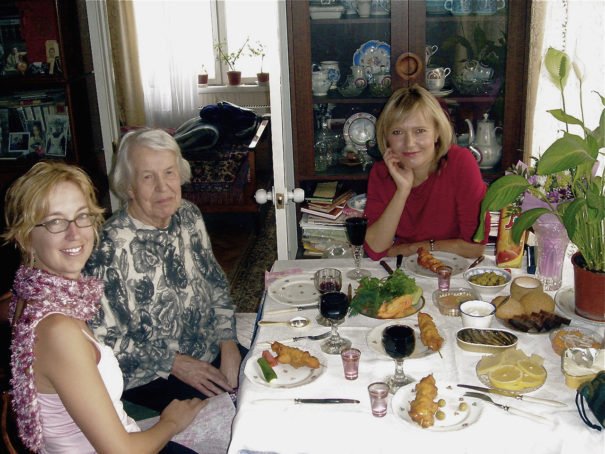
Can We Also Get Drunk With This Badass Centenarian Female USSR Combat Aviator Pls?

Can We Also Get Drunk With This Badass Centenarian Female USSR Combat Aviator Pls?
Georgian wine in Moscow
One afternoon more than a decade ago, in a shabby Moscow suburb, an 89-year-old war hero named Anna passed me a canteen of vodka. “It’s homemade!” she declared. “Just like my post-flight rations during the war.”
“Just like tank fuel,” my husband Hal said, grimacing. I translated; Yegorova laughed. “Ya pyanaya!” she grinned. “I’m drunk!” As were we all.
I’d traveled to Moscow to meet Anna Timofeyeva-Yegorova, hear her war stories, and sign an agreement to co-translate and edit her memoir. Yegorova joined the Red Air Force after Germany invaded the USSR. She flew combat missions in the Ilyushin-2 “Sturmovik” attack plane, and in August of 1944, she was shot down near Warsaw and captured by Nazis.
Sunlight streamed into her tiny dining room, where she’d laid out a spread of zakuski—small portions of olives, cured fish, pickles, and pork skewers—for me, Hal, and my fellow translator, Margarita. We sipped sweet Georgian wine as Yegorova recalled her missions and internment, paged through black-and-white photos of warbirds and comrades-in-arms, and showed us her combat medals.
Then she described what happened after her camp was liberated: Soviet troops turned her over to SMERSH, a military counterintelligence service (and portmanteau of the words “Death to Spies”). SMERSH operatives interrogated her for ten days, accused her of treason, and called her a “Fascist bitch”—all for the “crime” of being a POW. That afternoon, in her sun-washed apartment, she wept at the memory of that betrayal. We drank to her sacrifice, and the many forms it took.
Yegorova would have been anywhere from 99 to 101 this September. Sources cite conflicting birthdates, so let’s just call her 100. She was a child of the revolution, who helped build the Moscow Metro and learned to fly in a youth air club before the war.
Yegorova outlived the USSR, which definitely would have turned 100 this autumn. She loved her Rodina (“motherland”) with an ambivalent fervor. It was home, the place she’d fought for, and a nation that, for whatever reason, let women become combat aviators. But the USSR betrayed her sacrifice: they declared her politically suspect and rescinded her decorations for heroism. In 1965, Khrushchev “rehabilitated” her and awarded her the Hero of the Soviet Union title. But the pain of that earlier treachery never left her.
Her memoir tells the story of an ambivalent patriot, her outrage forever at war with a stubborn reverence for the old Soviet pieties. The false idols Yegorova once believed in began to fall in 1991, the year I first visited Moscow. Finally, we’re toppling our own here in the US—especially in the American South, where I’ve lived for most of my life. More than ever, I’m finding the more sanctimonious, flag-waving varieties of patriotism highly suspect. No matter where you’re from, patriotism is (and should be) complicated, ambivalent, and full of searching questions. Let’s drink to that.